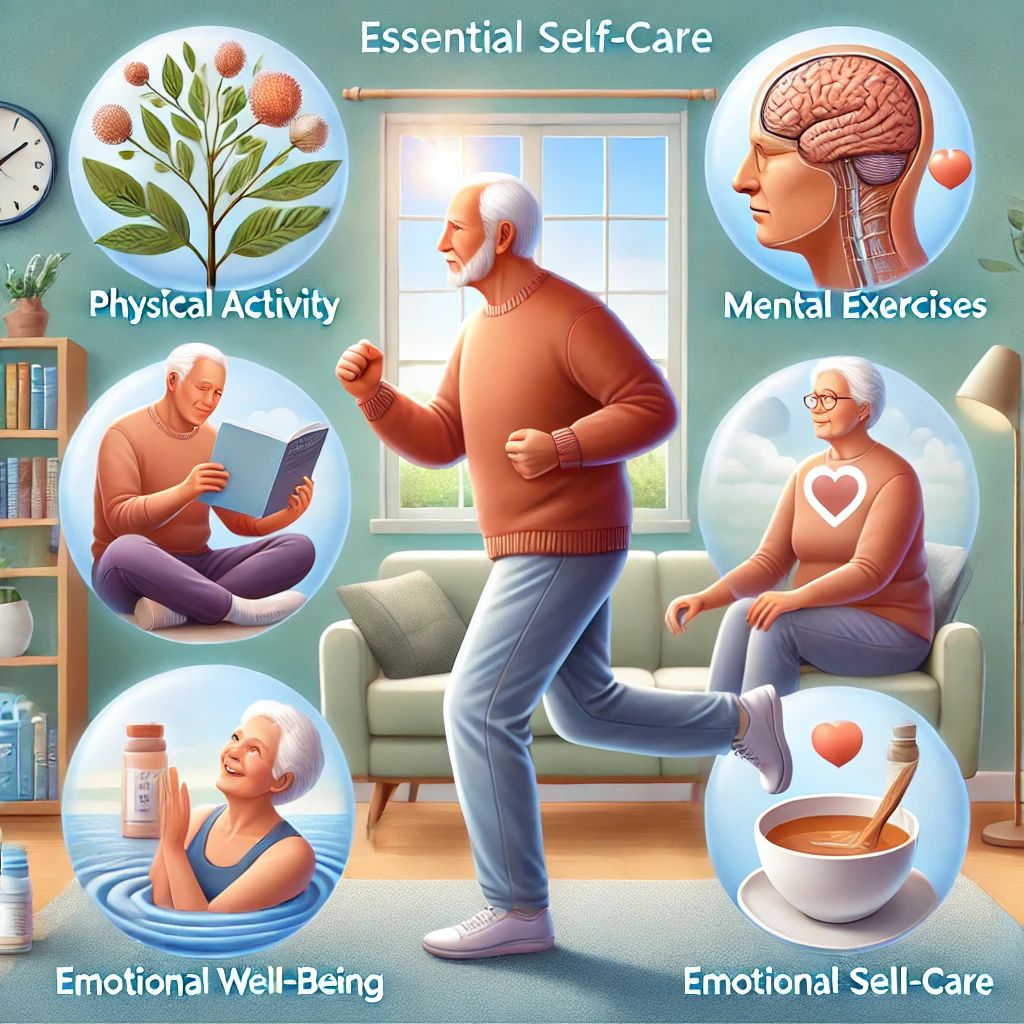
Why Self-Care is Important for Seniors
As we age, it becomes increasingly important to prioritize self-care to maintain physical health, mental clarity, and emotional well-being. Self-care for seniors focuses on nurturing the body, mind, and spirit to promote independence, prevent chronic health issues, and enhance the overall quality of life. By adopting healthy habits and routines, seniors can age gracefully while staying active and engaged.
Key Areas of Self-Care for Seniors
Self-care for seniors encompasses several aspects of health and well-being, including physical, mental, emotional, and social care. Here are some essential practices that seniors can incorporate into their daily lives:
1. Maintain Physical Health
Staying physically active and caring for your body is key to healthy aging. Regular exercise, balanced nutrition, and preventive healthcare play vital roles in maintaining mobility, strength, and overall vitality:
Stay active with low-impact exercises: Engage in activities such as walking, swimming, yoga, or tai chi to improve flexibility, balance, and strength. These exercises help maintain mobility and reduce the risk of falls.Strength training: Incorporating light strength training can help maintain muscle mass, support bone health, and improve balance.Prioritize nutrition: Focus on nutrient-dense foods, including fruits, vegetables, lean proteins, and whole grains. Proper nutrition supports energy levels, brain function, and immune health.Regular medical checkups: Schedule routine doctor visits to monitor and manage any chronic health conditions. Preventive screenings and vaccinations are also essential for long-term health.2. Nurture Mental Health
Cognitive health is a crucial part of self-care for seniors. Engaging in activities that stimulate the mind helps maintain mental sharpness, improve memory, and prevent cognitive decline:
Mental exercises: Keep your mind active with puzzles, crosswords, Sudoku, or brain games. Reading books, learning new skills, or taking up a hobby like painting or gardening can also enhance cognitive function.Mindfulness and meditation: Practicing mindfulness or meditation helps reduce stress, improve focus, and promote emotional well-being. Even a few minutes of deep breathing or meditation can have a calming effect.Stay curious: Lifelong learning is a great way to keep the brain engaged. Consider taking a class, learning a new language, or exploring topics that interest you.3. Emotional Self-Care
Emotional well-being is just as important as physical health, and seniors can benefit from practices that reduce stress and promote emotional balance:
Practice gratitude: Start a gratitude journal or take a few moments each day to reflect on the positive aspects of your life. Gratitude helps improve mood and emotional resilience.Stay connected: Strong social connections with family and friends help prevent feelings of loneliness and isolation, which can negatively affect mental and emotional health. Regularly check in with loved ones or join social groups or clubs.Express your feelings: Share your thoughts and feelings with trusted friends, family members, or even a counselor. Expressing emotions helps process difficult situations and reduces emotional strain.4. Create a Relaxing Routine
Seniors can benefit from a consistent daily routine that includes relaxation, self-care, and restful sleep:
Create a bedtime routine: Establish a relaxing evening routine that prepares your body and mind for restful sleep. This could include reading, listening to calming music, or doing gentle stretches.Get quality sleep: Aim for 7-9 hours of sleep each night. A comfortable sleep environment with a regular sleep schedule can improve sleep quality and overall well-being.Practice relaxation techniques: Incorporate relaxation techniques like deep breathing, meditation, or aromatherapy to help relieve stress and improve mood.5. Practice Preventive Skin Care
Skin care is an important part of self-care, especially as we age. Seniors may experience changes in skin texture and sensitivity, so it’s important to care for your skin with gentle, moisturizing products:
Moisturize regularly: Use a hydrating lotion or cream to keep your skin soft and prevent dryness or irritation.Protect your skin from the sun: Wear sunscreen daily, even when indoors near windows. Protecting your skin from UV damage helps prevent premature aging and skin cancer.Stay hydrated: Drinking plenty of water throughout the day helps keep your skin hydrated from the inside out.6. Stay Socially Engaged
Maintaining social connections is essential for emotional health and can help combat feelings of loneliness or isolation:
Join social groups: Participate in community events, clubs, or classes that interest you. Being part of a social group can provide a sense of belonging and purpose.Volunteer: Volunteering is a great way to give back while staying engaged with others. It provides opportunities to meet new people and stay active in your community.Keep in touch: Regularly connect with friends, family members, or neighbors. A simple phone call, video chat, or in-person visit can lift your spirits and strengthen relationships.7. Adapt Self-Care to Changing Needs
As you age, your body and mind may change, and it’s important to adapt your self-care routine accordingly:
Listen to your body: Pay attention to how your body feels, and adjust your self-care practices as needed. If certain exercises become too strenuous, modify them to be gentler on your joints.Stay flexible: Be open to new ways of caring for yourself, whether it’s trying different activities, adjusting your diet, or incorporating new relaxation techniques into your routine.Conclusion: Prioritize Your Well-Being with Self-Care
Self-care is essential for seniors to maintain independence, enhance quality of life, and promote overall health. By staying active, nurturing your mental and emotional well-being, and practicing preventive care, you can continue to live a fulfilling and healthy life. Embrace self-care practices that fit your unique needs and allow you to age gracefully with vitality and purpose.
The article was prepared by Lyle Gardner.



